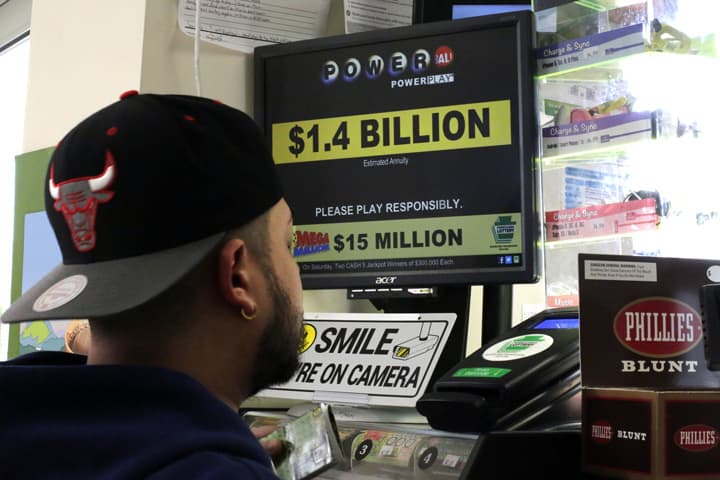Advertisement
The Odds — And Appeal — Of A Billion-Dollar Lottery
ResumePowerball fever. Against all odds, we’re lining up to take it all home. Are we crazy? We’ll look at the power of some big, big numbers.

It’s nuts to play. The odds of winning are infinitesimally small. The payout isn’t really what it seems. And yet, and yet. Just say the number…$1.5 billion…and the urge to be in the running, be in the game, have a shot, clearly begins to eat at a whole lot of people. And the dreams. The big spread. The place on the beach. The ease and splendor. Oh look, there we go. Powerball fever. This hour On Point, the human psychology and raw mechanics of Powerball.
-- Tom Ashbrook
Guests
Michael Hiltzik, business columnist for the Los Angeles Times. (@hiltzikm)
Maeve Pages, On Point intern. Clerk at Upper Falls Discount Liquors in Newton, Mass. Student at the University of Massachusetts, Amherst studying international studies and journalism. (@MaevePages)
Frank Farley, professor of psychology at Temple University. Former president of the American Psychological Association.
Susan Bradley, financial planner and founder of the Sudden Money Institute. Author of the book, "Sudden Money." (@SuddenMoney)
From Tom’s Reading List
Los Angeles Times: How the Powerball rules were tweaked to make the game an even bigger ripoff — "The sociological answer is that lower-income people have a greater need to relieve tension in their daily lives, gambling is a socially acceptable way to do so, and only the lottery offers the lure of a potentially life-changing payoff. Another attraction, the German researchers conjectured, is that lotteries are egalitarian — every buyer of a ticket has the same chance of success. That may be more appealing to those in lower socioeconomic strata, for whom equal opportunity may seem like a rare break, than to the more affluent, who may look at an equal-opportunity situation as one working to their disadvantage."
CNBC: Tallying the big tax bite of a $1.5B Powerball win — "Sorry, Powerball hopefuls, but there's no way you're walking away with the entire $1.5 billion. It's not simply an issue of the odds — although the Multi-State Lottery Association puts the chance of winning the grand prize at 1 in 292.2 million. Or the implications of having to share Wednesday's record-high pot if there are multiple winners. It's the taxes that'll get you."
Dallas Morning News: Mark Cuban’s tips for eventual winner of the $1.4 billion (or more) Powerball jackpot — "A winner of the record $1.4 billion Powerball jackpot Wednesday night – if there is a winner this time – will enter a rarefied world of the super-rich. The one or ones with lucky tickets won’t be billionaire rich; an upfront payout and taxes cuts that down to only $651 million or maybe a little less. But he or she will have billionaire-type problems and advantages."
This program aired on January 13, 2016.